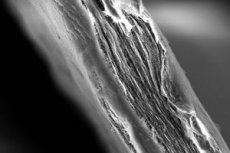New publications
A filter has been invented that rids water of viruses
Last reviewed: 02.07.2025

All iLive content is medically reviewed or fact checked to ensure as much factual accuracy as possible.
We have strict sourcing guidelines and only link to reputable media sites, academic research institutions and, whenever possible, medically peer reviewed studies. Note that the numbers in parentheses ([1], [2], etc.) are clickable links to these studies.
If you feel that any of our content is inaccurate, out-of-date, or otherwise questionable, please select it and press Ctrl + Enter.

Israeli chemists have invented specific organic structures capable of cleaning water from viruses of various sizes. This information was shared by the periodical Water Research.
"Purifying water from viruses is an important task, the solution of which can simultaneously resolve the issue of public safety. Increased levels of adenovirus infection in sewage systems are already observed in some states in America: adenoviruses often penetrate into drinking water sources, as well as into public water bodies," comments Dr. Moshe Hertzberg, representing Ben Gurion University (Negev).
Over the past ten years, experts have received a lot of reasons for concern: water pollution in populated areas, huge growth of industry - all this has a dramatic impact on the state of the environment.
Dr. Herzberg and other university staff have set themselves the goal of eliminating as many bacteria and viruses from wastewater as possible.
It is worth noting that removing bacteria from water is a relatively simple process. The same cannot be said about viruses, which easily overcome any filtration systems that hold microbes. Experts have figured out how to hold viruses: they have come up with a special filtration material based on hydrogel – a dense jelly substance that consists of water and highly polar organic particles.
Hydrogel has been used to purify liquids from microbes and nanoparticles before. However, it was discovered that as the filtration proceeded, the membrane pores became heavily clogged and did not pass water well. After the scientists conducted their research, it turned out that viruses were retained in such filters not because the pores narrowed and clogged, but because they were covered with various organic substances with charged particles. To put it simply, the viruses did not pass through the filter because they were repelled by molecules with a positive or negative charge.
Scientists covered the surface of the filters with zwitterions - these are unique organic particles that have partially extremely positive and extremely negative charges. The first experiment was successful: the membrane filter slightly reduced its throughput, but stopped letting viruses through - both small viruses and large ones - up to 170 nm long.
The researchers calculated that the total number of viruses in the water decreased by approximately 1 million times. This allows us to state that the water has been almost completely cleared of pathogenic microorganisms.
According to scientists, such a filtration system will be able to contain the spread of all kinds of toxic infections, noroviruses and adenoviruses that enter the body after drinking dirty water. Portable filtration systems with hydrogel can also be used - for example, to purify water in field conditions or in underdeveloped countries where there are no full-fledged water supply systems and water treatment facilities.
 [ 1 ]
[ 1 ]
